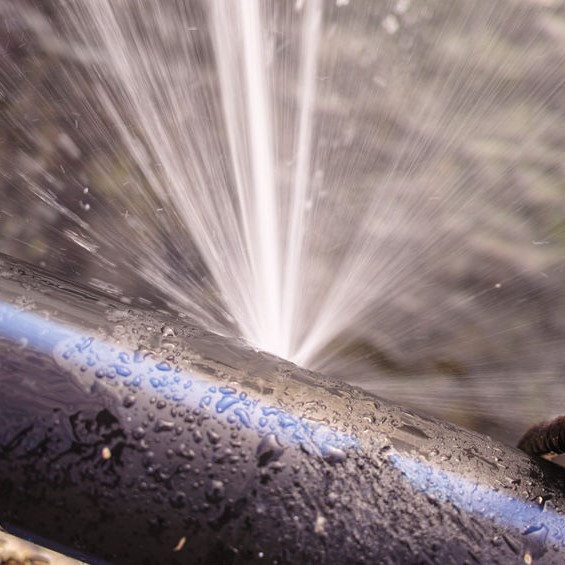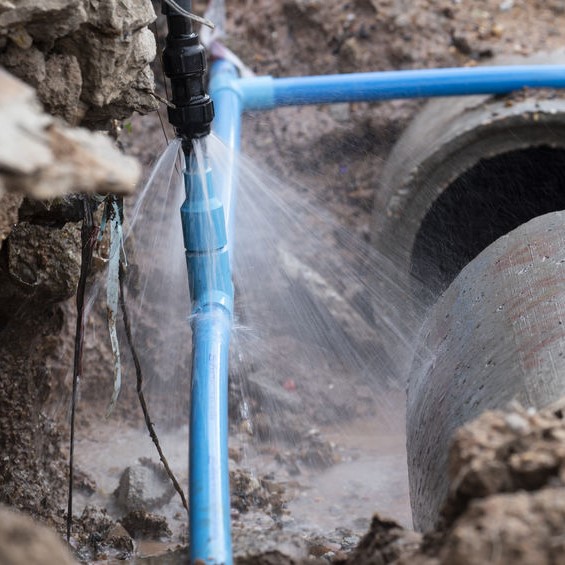
What causes a burst water pipe?
After a hot summer, we all look forward to a cool fall and even a few days of a cold winter. Until the ground gets frozen and water pipes begin freezing up and burst. There is nothing worse than dealing with a burst pipe in the middle of cold winter day or night.
A burst pipes is a common plumbing issue for homeowners. It can happen any time of the year and without any warning at any point of the plumbing network or the incoming water supply pipes. Even though water supply pipes are designed to withstand force and pressure, a burst pipe will still happen. So why do pipes burst ? Here we have a list of the key reasons for pipe bursting:
- Frozen: In many parts of the country, like Pennsylvania, homeowners prep their homes because we know the ground is going to freeze. Frozen ground means frozen water pipes if precautions aren’t taken before winter arrives. Water will freeze in a pipe with a temperature at four degrees below zero. When the water freezes in the pipe, the pressure becomes considerably high and keeps accumulating to the point of expanding inside the pipe. Eventually one end you’ll have a burst pipe, and the other end a leak. Guess which end gets the leak?
- Aged: Metal or plastic, all water pipes age and will only last for so long. The elements affect their lifespan, like the frozen water we mentioned above, and if they are regularly inspected and maintained. serviced. Water pipes typically have a twenty-year life before they become structurally degraded to the point they can’t withstand water pressure, particularly metallic pipes which can corrode and burst pipe results. With a plastic water pipe, the plastic gets brittle over time and the pressure of water can cause a burst pipe.
- External Pressure: External pressure can cause a burst pipe, typically from tree roots. However, if the water pipes are installed in certain places, like under roadways, cars driving over the road will put pressure on the pipe. Another external pressure is excavation by construction equipment that will squeeze the pipes more than their structural limit and the pressure will cause a cracked or burst pipe. This leads to leaking pipes underground and the task of finding the leakage can be daunting. All the while you’re looking for the leak, it can still be causing other damage.
- Clogs: Clogged water pipes are a major cause of burst pipes. Clogs happen when the accumulation of minerals and other debris coagulates inside the pipe. A massive clog will hinder water flowing and it backs up until has created incredible pressure resulting in burst pipes and leaking pipes.
- Excessive Pressure: A water pipe is designed to withstand a certain limit of water pressure. When that water pressure is exceeded, usually by an increase in the volume being pumped through, it can result in a burst pipe. Heavy rains can cause the ground to move too, even uncovering water lines, exposing them, and result in burst pipes.
- Incorrect Pipework: When plumbing pipework is done by an inexperienced person, it isn’t always connected and laid properly, resulting in burst pipes. A qualified plumber has gone through training and apprenticeships, testing and ss licensed, making them the right person to have any plumbing installed, laid, or connected. They know how a pipe should be installed to keep it strong and less likely to result in a burst pipe.
What happens when your pipes burst?
A burst pipe inside or under your home can cause a lot of damage. It could be immediate damage or an eventual, slow damage, depending on the location of the burst pipe. The size of the burst pipe can create severe damage or slight damage to your floors, walls, and belongings, even the ceiling if the burst pipe is in an upstairs bathroom.
How do you fix a burst pipe?
Every homeowner should be prepared to defend the plumbing system against any burst pipe, repair with a quick temporary fix until the plumber arrives. Why? To save you money and trouble with the damage that a burst pipe can cause! So, what can you do for that quick fix?
- Duct Tape: Apply pressure to the burst pipe by tightly wrapping duct tape around the busted area. This is the one fix that will last the shortest amount of time because duct tape isn’t going to have much pressure.
- C-Clamp: Turn the water off at the main shut-off and place a piece of rubber over the pipe burst area. Place a piece of wood on top of the rubber and the place a C-clamp over that, with the C-clamp opposite of the burst pipe, then screw the clamp down to the wood.
- Sleeve Clamp: A sleeve clamp is two semicircular metal pieces that will make a whole metal sleeve when put together around the burst pipe. Wrap the burst pipe section with the gasket material that comes with the sleeve clamp, surrounding the pipe, the place each part of the sleeve on the pipe and connect with the screws that are provided.
- Call the plumber! These are only temporary fixes, so calling your plumbers sooner than later is recommended.

How do you know if your pipes burst?
Here are a few different ways to identifying burst pipes in, under, or coming into your home:
- Inspect the interior. Check all areas where water is located in your home. The bathrooms, kitchen, laundry room, and basement. Check the rooms next to those rooms too, inside closets, etc. Look for water actively dripping or signs of water leaks like a damp area or water stains. Check all exposed water lines for any bulges, condensation, or frost.
- Inspect unheated areas. Wherever water supply lines run that isn’t heated should be checked regularly during the winter, like crawl spaces and unfinished basements, the attic, or the garage. These areas are susceptible to freezing and if you notice any pooled water or other indications of burst pipe, call your plumber after following the temporary fixes we offered above.
- Check the functionality. After you have completed the stuff we listed so far, turn on the cold and hot water at all faucets and flush the toilet. If they see to have lost pressure or the water is discolored, you have a leak somewhere.
- Inspect the exterior. Walk around the exterior of your house and see if there is any water standing in places that it normally isn’t, or are there any sinkholes? If yes to these two things, call your plumber.
So, can a leaking pipe burst? Absolutely! Just because it appears to be a small leak, doesn’t there isn’t pressure on water pipes. The constant drip is actually eating the pipe, and that ongoing pressure will eventually push a hole through the pipe to the point of a burst pipe and bigger problems. Call 484-366-9362 today!

